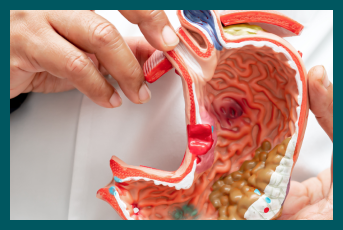Bloating, pain, and gas: When to talk to a GP
Written by the editorial staff writer at Hola. Medically Reviewed by Dr Nelson Lau, MBBS FRACGP, GP & Digital Health Specialist. Originally published on 03 May 2024. Blog updated on 22 September, 2025.

Contents

Summary
Most of us have felt bloated, gassy, or uncomfortable after a heavy meal. While these symptoms are common and often harmless, persistent bloating, abdominal pain, and excessive gas can sometimes signal something more serious. Knowing when to monitor your symptoms at home and when to seek medical advice from a GP can make all the difference for your health and peace of mind.Why do bloating, pain, and gas happen?
Bloating refers to a sensation of fullness, pressure, or swelling in the abdomen. It's often accompanied by visible distension of the stomach. Gas is a normal by-product of digestion, as your gut bacteria break down food and release gases like carbon dioxide and methane. Mild abdominal pain or cramping can also occur as part of this process. Common, everyday causes include:- Eating too quickly – swallowing excess air while eating or drinking
- Carbonated beverages – fizzy drinks increase gas buildup
- High-fibre foods – beans, lentils, cabbage, and certain vegetables create more gas
- Food intolerances – such as lactose intolerance or gluten sensitivity
- Hormonal changes – particularly around menstruation
- Constipation – slower bowel movements mean more fermentation of food in the gut
When are these symptoms normal?
Occasional bloating and gas are part of normal digestion. You might notice symptoms:- After eating a large or rich meal
- Following a period of eating more processed foods than usual
- During travel or disrupted routines that affect digestion
- Around your menstrual cycle
Experiencing these symptoms? Speak with a doctor within 15 minutes.
See a Doctor now
Available 24/7, across Australia.
When to consult your GP
It's important to recognise when bloating, pain, and gas could be a sign of something more serious. You should book an telehealth appointment with your GP if you experience:1. Persistent or severe symptoms
If bloating, gas, or abdominal pain occur frequently (several times a week) or do not improve with simple changes, it's worth getting checked. Chronic discomfort could signal irritable bowel syndrome (IBS), food intolerances, or other digestive issues.2. Unexplained weight loss
If you're losing weight without trying, it could indicate malabsorption, inflammatory bowel disease (IBD), or even certain cancers.3. Changes in bowel habits
Diarrhoea, constipation, or alternating between the two—especially if it's new for you—warrants a medical review. Blood in the stool is particularly concerning and should be assessed promptly.4. Severe or worsening pain
Pain that is sharp, intense, or increasing in frequency should not be ignored. It could indicate gallstones, ulcers, or an obstruction.5. Feeling full quickly
If you get full after eating only small amounts, this could suggest issues with your stomach or digestion that need further evaluation.6. Abdominal swelling that doesn't go away
Persistent abdominal distension (not just temporary bloating after meals) may point to fluid buildup in the abdomen or ovarian problems in women.7. Fever, nausea, or vomiting
If bloating and pain are accompanied by systemic symptoms like fever, persistent nausea, or vomiting, you should seek medical advice.Possible underlying conditions
Your GP may consider a range of possibilities if your symptoms are persistent or severe:- Irritable Bowel Syndrome (IBS): A common condition causing bloating, abdominal cramps, diarrhoea, and/or constipation.
- Food intolerances: Such as lactose or gluten intolerance.
- Coeliac disease: An autoimmune response to gluten that damages the small intestine.
- Inflammatory Bowel Disease (IBD), including Crohn's disease and ulcerative colitis, can cause symptoms such as pain, diarrhoea, and weight loss.
- Gastro-oesophageal reflux disease (GERD): Can contribute to bloating, pain, and discomfort after meals.
- Gallstones or liver disease: Sometimes responsible for upper abdominal pain and bloating.
- Gynaecological issues: In women, ovarian cysts or other conditions may cause bloating and pain.
- Cancer: Rarely, persistent bloating, pain, and changes in bowel habits can be linked to bowel or ovarian cancer. This is why persistent symptoms should not be ignored.
What your GP might do
When you see your GP, they will usually:- Take a full medical history and ask about your symptoms, lifestyle, and diet.
- Perform a physical examination.
- Consider arranging blood tests, stool tests, or urine tests.
- Depending on findings, refer you for imaging (such as ultrasound or CT scans) or specialist referral (such as gastroenterology or gynaecology)
Managing symptoms at home
If your GP rules out serious illness, there are still steps you can take to manage bloating, pain, and gas:- Eat slowly and chew thoroughly to reduce swallowed air
- Limit fizzy drinks and chewing gum
- Keep a food diary to identify triggers
- Try smaller, more frequent meals instead of large portions
- Increase physical activity to stimulate digestion
- Stay hydrated to reduce constipation
- Consider probiotics (after consulting your doctor) to support gut health
Feeling sick and unsure why? Speak with a GP online in 15 minutes.
See a Doctor now
Available 24/7, across Australia.
What we treat
- Cough
- Nausea & vomiting
- Fever
- Hayfever
- Fatigue
- Sore throat
- Acne
- Hair loss
- Gout
- Eczema
- Rosacea
- Sunburn
- UTI
- Erectile dysfunction
- Contraception
- Morning sickness
- Morning after pill
- Prostate health
- Anxiety
- Depression
- Stress
- Grief & loss
- Antidepressants
- Premature ejaculation
- Asthma
- Blood pressure
- Blood thinners
- Diabetes
- Cholesterol
- Migraines & headaches
- Allergies
- Body ache
- Heartburn & reflux
- Sleep disorder
- Pain relief
- Gastro
Related Articles
Disclaimer
This blog is for general informational purposes only and does not indicate that Hola Health provides all treatments or preventive measures mentioned. It is not intended to be a substitute for professional medical advice. Always seek the guidance of your doctor or other qualified health professional with any questions you may have regarding your health or a medical condition. For emergencies please immediately contact 000. Any medical topics discussed are intended to educate, not to imply availability through Hola Health.
 Facebook
Facebook  X
X  Copy Link
Copy Link



